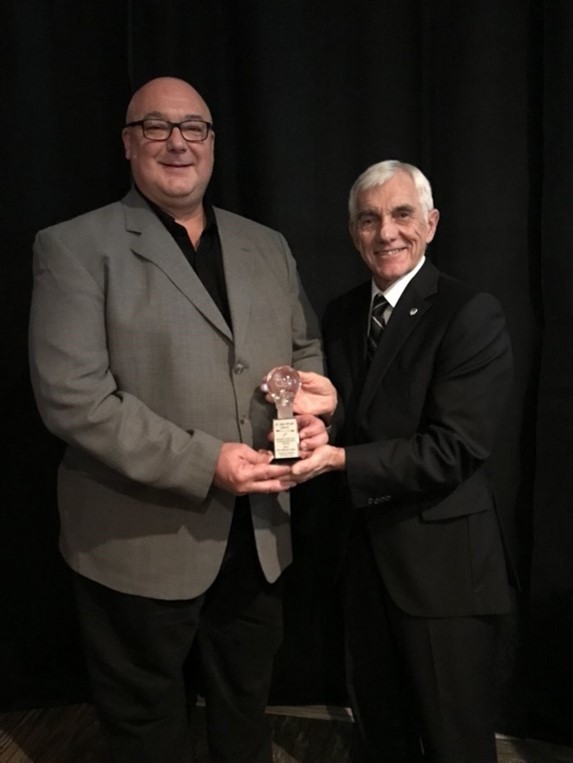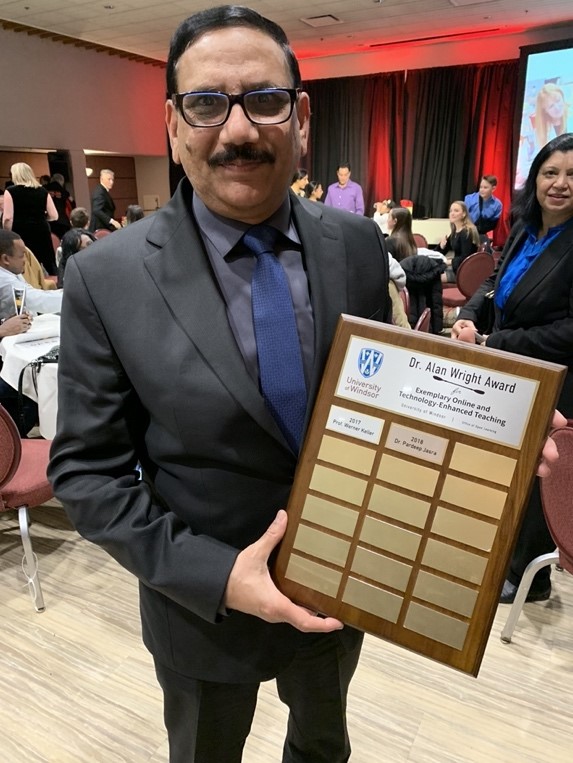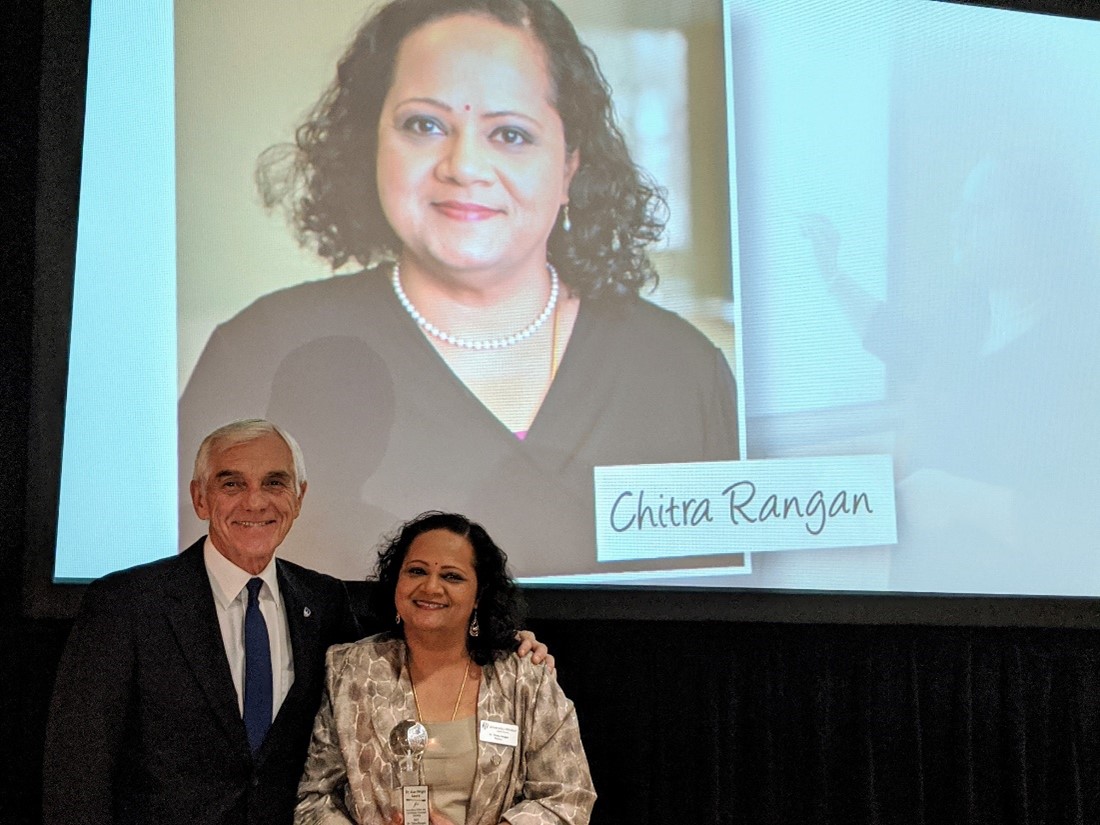Sponsored by the Office of Open Learning, the Dr. Alan Wright Award for Exemplary Digital Teaching recognises exceptional educators who have demonstrated a committment to innovation and excellence in teaching in digitally enabled learning environments.
The award recognises educators who have engaged in scholarly teaching practices to develop effective online and technology-enhanced learning environments. Winners of this award will be outstanding educators who use exemplary teaching practices worthy of sharing broadly with the university community.
Eligibility
-
The award is open to all instructors at the University of Windsor, including full- and part-time regular faculty, Academic Ancillary Staff, sessional lecturers, sessional instructors, librarians, and staff.
-
Chairs and departments heads are eligible for nomination.
-
Winners of other teaching awards are eligible for nomination.
-
Re-nomination of unsuccessful nominees from previous rounds is encouraged.
-
Previous winners of this award are not eligible to apply again within 5 (five) years of their award.
-
Previous winners of the Brightspace Innovation Award for Teaching and Learning (https://www.stlhe.ca/awards/d2l-innovation-award-in-teaching-and-learning/) are not eligible as this award is intended, in part, to prepare individuals for the Brightspace Innovation Award and other technology-enhanced teaching awards.
Applications
Applications should demonstrate evidence of achievement of a range the following criteria*:
-
Sustained excellent teaching in online, open, blended, hybrid, hy-flex, or other digitally enabled learning setting;
-
Digitally enabled teaching practices that promote student engagement, achieve desired learning outcomes, or meet with student satisfaction;
-
Development and/or implementation of pedagogical innovations, especially those that have influenced colleagues’ digitally enabled teaching methods and effectiveness;
-
Commitment to Indigenization, decolonization, and reconciliation in digitally enabled teaching
-
Commitment to anti-Black racism and advancement of diverse ways of knowing in digitally enabled teaching
-
Commitment to equity, diversity, inclusion, and accessibility in digitally enabled teaching;
-
Commitment to adopting, adapting, and creating open educational resources;
-
Incorporation of scholarly and/or creative teaching practices (e.g., experiential learning);
-
Supporting student success in digitally enabled teaching and learning contexts;
-
Commitment to continuous improvement of digitally enabled teaching practice;
-
*Note: it is expected that applicants will have varying areas of strengths, and not all criteria will be equally represented in the profile of all nominees.
All applications will be evaluated by a broad committee based on the evidence presented.
Nomination Process
Candidates can be nominated (or co-nominated) by faculty colleagues, academic administrators, staff, students, Indigenous Elders, Knowledge Keepers, or community members. Self-nominations are also acceptable. In the spirit of Universal Designs for Learning (UDL), video and/or audio recorded submissions that address the award criteria and are accessible to the award committee will be accepted (e.g., link to a captioned video on Yuja or YouTube). Nomination packages should contain the following:
Complete submissions should not exceed 30 pages, and ensure all material is relevant to the award.
-
Cover Letter: A cover letter (2-page maximum), or video and/or audio recording (5-minute maximum) with the rationale for the nomination and a summary of the candidate’s major strengths.
-
Teaching Dossier: A concise digital dossier (10-page maximum) or recording (20-minutes maximum) providing evidence of how the nominee meets the criteria. The dossier should focus on the candidate’s teaching philosophy, digitally enabled teaching practices in courses and programs, student feedback, and teaching-related scholarship and other professional contributions. Appendices may be included as links in the dossier. The appendices should constitute a summary of demonstrated qualifications for the award.
-
Letters of Support: Minimum 1 letter of support or video and/or audio recorded submission from a colleague, administrator, staff member, Indigenous Elder, Knowledge Keeper, or community member AND 1 letter from a student with personal knowledge or experience of the nominee’s digital teaching practices.
Complete submissions should not exceed 30 pages, and evidence ensure all material is relevant to the award.
All applications will be evaluated by a broad committee based on the evidence presented. The selection committee reserves the right to withhold the award in any year where nominations do not meet criteria/eligibility standards.
Potential Evidence
Evidence of effective digitally enabled teaching practices come from a variety of sources. Some of these may include, but are not limited to:
-
Activities that motivate and engage students in deep learning practices
-
Commitment to principles of flexibility and accessibility in teaching;
-
Approaches that encourage interaction, peer-based learning, or collaborative learning;
-
Approaches that provide experiential learning opportunities;
-
Alternative assessment methods for student learning;
-
Research- or evidence-informed teaching methods;
-
Involvement of students as partners in developing effective digital teaching and learning environments;
-
Scholarly dissemination of digital teaching and learning practices, for example at a conference, departmental seminar, publications;
-
Adoption, adaptation, or creation of open educational resources;
-
Improved student learning outcomes, student recruitment/retention, program enrollment, or students' satisfaction;
-
Positive student and/or peer feedback on pedagogical innovations;
-
Commitment to building a learning community and rapport with learners in and beyond the virtual classroom, for example, student feedback, letters of support, emails, Teams messages (with permission);
-
Evidence of how practice is being shared to help other instructors enhance their pedagogy (e.g., conferences, workshops, sharing of teaching materials);
-
Evidence of thorough preparation for digital teaching for example, syllabi, course outlines, lesson plans, modules, videos, storyboards, scripts, etc.;
-
Evidence of alignment of learning outcomes, learning activities, and assessment practices, for example, using a lesson plan or curriculum map.
Selection Committee
The Dr. Alan Wright Award for Exemplary Digital Teaching is sponsored by the Office of Open Learning. The Selection Committee will be chaired by a representative from the Office of Open Learning.
Announcement of Award Winners
The 2024 award winner(s) will be celebrated at the Celebration of Teaching Excellence, in 2025.
Nomination Timeline/ Deadline
2024 Nominations are now closed. Thank you to all who submitted nomination packages!
The Office of Open Learning will issue a call for nominations annually. Complete nomination packages must be submitted by email before 11:59pm to the Office of Open Learning (openlearning@uwindsor.ca), in Word or searchable-PDF format.
Previous Award Recipients:
2017: Dr. Werner Keller

2018: Dr. Pardeep Jasra

2019: Dr. Chitra Rangan

2023 Winners will be celebrated at the Centre for Teaching & Learning's Celebration of Teaching Excellence.
(Note: no call was issued in 2020 and 2021.)

